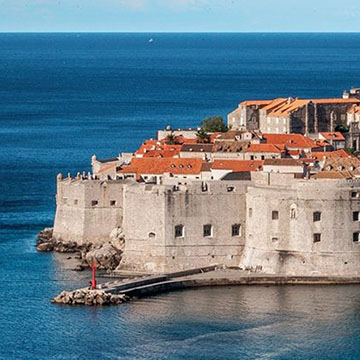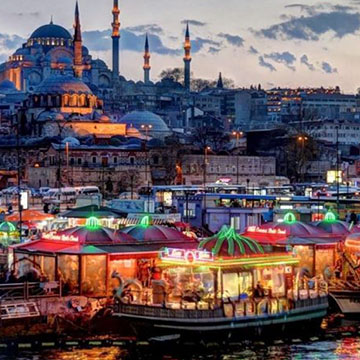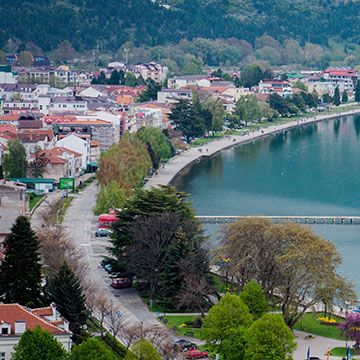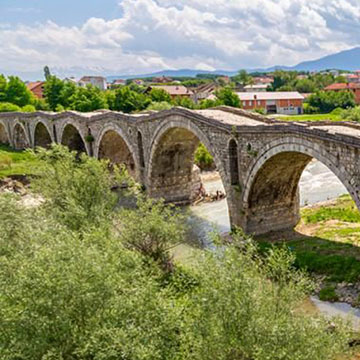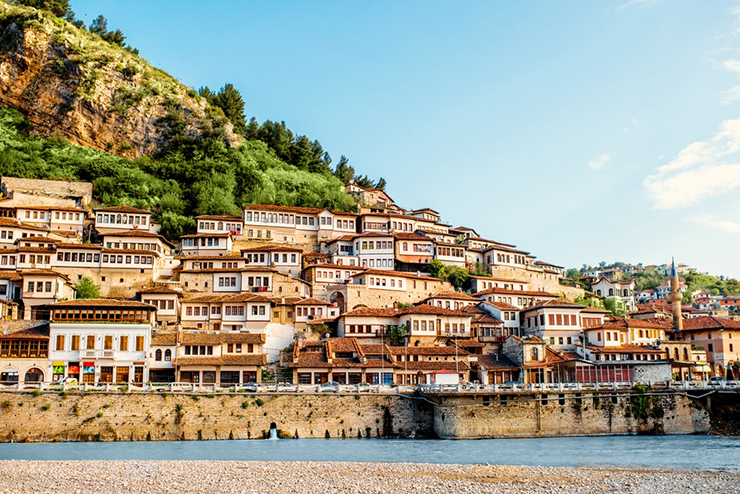
Albania
The borders of Albania, located in Southern Europe, are drawn with Montenegro to the north, Serbia to the northeast, Macedonia to the east, and Greece to the south. Additionally, the country has a coastline along the Adriatic Sea to the west and the Ionian Sea to the southwest.
While the majority of the Albanian population is of Muslim origin, there are significant minorities belonging to the Christian (Orthodox or Catholic) faith. Marriages between people of different religious backgrounds are common, and in some places, it is even a rule.
One of the country's major challenges is the weakness of its infrastructure, which remains in poor condition despite improvement efforts. Most Albanians prefer to travel using special minibuses called "furgons" or public buses. Train journeys, with very cheap tickets, offer priceless views of people working in the fields and the surrounding atmosphere. Hitchhiking is not common, but cyclists are respected on the roads.
There are no vaccination requirements for entering or leaving the country. In the summer months, using insect repellent spray can be beneficial, especially in the western plains, which were once marshlands and are now active mosquito areas. Caution is advised on beaches and in the sea due to encounters with glass fragments and sea urchins.
Although not a prominent destination in the tourism sector, Albania, being a Mediterranean country, has many advantages. It is much cheaper and less crowded than more popular holiday destinations, making it a must-visit for those who love the wild nature, scenery, and Mediterranean atmosphere.
In the city of Berat, located in the middle of Osum, a castle was built in the past and stands on a hill. On this hill, the original form of Kalaja Castle can be seen, and many churches and mosques are located here. Berat is also called the "city of a thousand windows" because of the large windows in front of houses, creating the silhouette of the city.
Compared to the Italian Riviera in the southwest of the country, the Albanian Riviera is quieter and less crowded.
For history enthusiasts, the city of Fier is near the ancient city ruins of Apollonia. Apollonia is the largest and most important city in the ancient world, featuring libraries, temples, theaters, triumphal arches, and decaying buildings that can be visited.
In the south of Albania, Gjirokastra, with its unique architectural style, is listed on the UNESCO World Heritage List. These unique buildings are among the most beautiful examples reflecting Balkan architecture and resemble small stone castles. The stones used in ancient times, now serving as steps, have become a symbol of the city, hence the name "the city of stones."
Those who want to learn about the country's culture should definitely visit the capital, Tirana, for museums and cultural activities.
Albania's Capital, Cities, and Regions
Albania, governed by a unitary parliamentary republic, is divided into 12 administrative regions, 36 districts, and 61 municipalities. The capital is Tirana, and major cities include Berat, Durrës, Elbasan, Fier, Gjirokastër, Korçë, Lezhë, Shkodër, Vlorë, and Kukës.
When to Visit Albania
The country, dominated by the Mediterranean climate, experiences hot weather along its coastal areas due to heat waves. The winter season is mild with light rains and moderate temperatures. The best time to visit Albania is in May, June, and September.
Albanian Culture
With the contributions of Albanian culture, the people of the country are very hospitable and take pride in it. Albanians, known for their warmth, love long walks in the city streets, abstaining from coffee, especially the younger generation enjoys nightlife activities and dancing.
Albanian Cuisine
Like many Mediterranean and Balkan countries, Albanian cuisine has been shaped under the influence of a strong and long history. Various empires, including Greece, Serbia, Italy, and the Ottoman Empire, have dominated the region at different times, leaving deep traces in Albanian cuisine.
Souvenirs from Albania
Almost all of Albania, especially from Tirana and the traditional Kruja Bazaar, offers souvenirs and handicraft items.
Albania's Festivals
Due to Albania's historical, ethnic, and religious backgrounds, various cultural and art festivals are celebrated throughout the country every year. The largest is the pagan Summer Festival celebrated every year on March 14th. The festival is designed to celebrate the end of winter and the rebirth of nature, symbolizing renewal among Albanians.
Holidays/Feasts/Important Days in Albania
Summer Day Holiday (March 14)
Nevruz Festival (March 22)
Easter (March 25-28)
Labor Day (May 1-2)
Ramadan Bayram
Sacrifice Feast (September 13)
Mother Teresa's Blessing Day (October 19)
Albanian National Day (November 28)
November 29 Liberation Day (November 29)
National Youth Day (December 8)
Christmas (December 24-26)
Albania's Climate and Weather
Albania, located in Southern Europe, has a Mediterranean climate. Winter months are mild and rainy, while the summer season is hot and dry.
Brief History of Albania
Before coming under the protection of Nazi Germany in 1943, Albania was invaded by Italy in 1939, and the Greater Albania was established. Albania underwent significant social and political transformations during the communist era and remained highly isolated from international communities. In 1991, the Socialist Republic collapsed, and the Republic of Albania was established.
Albania's Economy
Albania's transition from a socialist planned economy to a free-market capitalism system has been largely successful. Agriculture, being a traditional farming country, is one of the most important economic sources. However, the country, heavily affected by the crisis, has a high poverty rate, and traditional farming methods are still used, contributing to inefficiency.
Languages Spoken in Albania
Albania's official language is Albanian. Albanians generally speak more than two languages. English, Italian, and Greek are the most commonly spoken languages, while French, although not very common, is also known. Other spoken languages include Serbian, Romanian, German, and Turkish. It is advisable not to speak Serbian unless necessary due to political issues with Serbia.


